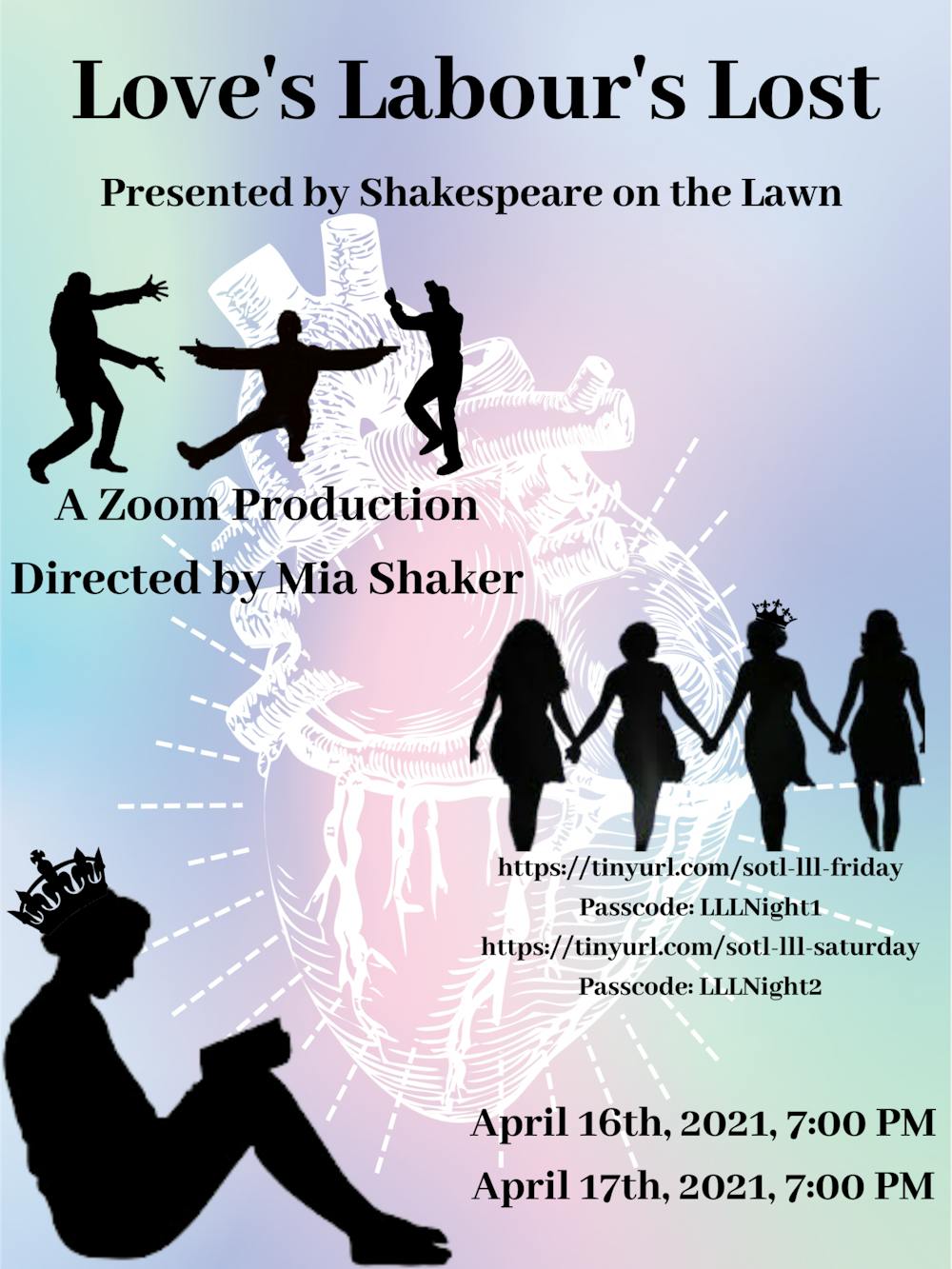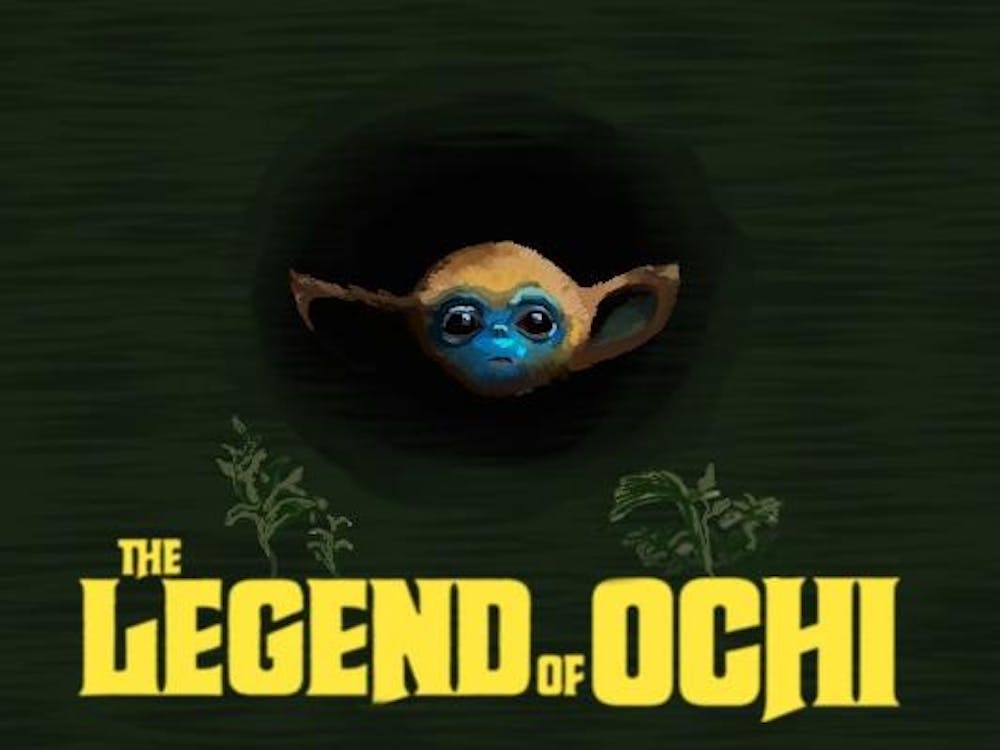The leadership team of Shakespeare on the Lawn did not know what the spring production of “Love’s Labour’s Lost” would look like come opening day — even when rehearsals started at the beginning of the semester. The pandemic and safety protocols shifted several of their past shows online, forcing the group to be creative about how to stage Shakespeare’s works using different online formats. This Friday and Saturday, the cast will take to the Zoom stage to perform the comedy.
“Love’s Labour’s Lost,” an early comedy, dates back to around the 1590s. In it, the King of Navarre and three of his lords swear off the company of women but soon become infatuated with the visiting Princess of France and her ladies. The classic elements of a Shakespearean comedy follow — mistaken identities, farcical tricks and revelations abound. It has been more resistant to adaptation than some of Shakespeare’s other works, but Mia Shaker — fourth-year College student and director of “Love’s Labour’s Lost” — picked it with many advantages in mind.
“I wanted to pick a show that we could really make our own and have fun with and not be working against a lot of other famous versions,” Shaker said. “We could have the ability to make discoveries for ourselves and create our own thing off of Shakespeare's work.”
Shaker said the choice to present the show online provided opportunities to be both inclusive and innovative. Her assistant director, second-year College student Ria Kharosekar, has been living in India but is still involved in the production. She’s also declared the Zoom chat a “free-from-work” space, to preserve some of the community-building and general silliness that would occur during in-person rehearsals, but can be challenging to establish in an online space.
“At this point, regulations are relaxed enough that we could have tried to do it as a live performance, but I'm actually really happy with how it's gone virtually,” Shaker said. “We've managed to find ways to use the Zoom format in our favor. That's always kind of fun, to just explore a completely different medium than the stage for performance.”
Putting the show on the Zoom screen has called for a significant amount of adaptation from cast and crew members. Charlie Mooz, second-year College student and stage manager for “Love’s Labour’s Lost,” talked about how his job has changed from productions past.
“Normally in person, I'm doing a lot with making sure [the actors] and all of the props and set pieces are in their places, but I can't exactly do that if I can't see any of it or I can't direct people to certain places,” Mooz said. “So, I really need to make sure that I have everything set for it and organized electronically.”
Zoom also forced Shaker and Mooz to think about traditional stage blocking in different ways. Instead of directing actors to move in certain ways on a physical stage, Mooz now has control of the orientation of cast members on the Zoom screen and can change it in order to enrich the performance.
Of course, acting out Shakespeare over Zoom is another challenge. Shaker and the cast have had to think about what to do about the built-in lag time on the platform — Shaker says having actors speak faster than normal may sound strange to them but works for the performance — and how to convey physical humor with little freedom of movement.
Bob Lynch, fourth-year College student and actor in the production, spoke on how his performance changes on the Zoom screen versus in person.
“I think the part that's maybe the most different is the actual performance in and of itself, because you lose half of the job, you know?” Lynch said. “We've all become orators, essentially, where our voices kind of have to carry the whole show because we can't do anything with our bodies because we're stuck sitting still.”
Lynch is playing two roles in the performance and is eager, like Shaker, to bring his own choices to a little-adapted work such as “Love’s Labour’s Lost.” When the audience is expecting a scene to be played a certain way because of its ubiquitous cultural recognition — think “Hamlet” and Yorick’s skull — it binds the actor to the audience’s expectations. With this play, Lynch says, he feels much more free.
“People don't really know ‘Love's Labour's Lost’ or what happens in it, so it gives us a lot more free rein,” Lynch said.
While one of his characters, Boyet, has usually been played as an older man, Lynch said he plans on going the opposite direction and thinks of him as a teenager.
“I'm gonna play him that way, and I don't have to feel self-conscious about that and think ‘Why didn't other people do this?’ because not that many other people have done it,” Lynch said.
After more than a year of reimagining what theatre is and how it can be presented, Shakespeare on the Lawn’s production of “Love’s Labour’s Lost” is sure to have some delights and surprises in store.
Shakespeare on the Lawn’s production of “Love’s Labour’s Lost” will be presented virtually via Zoom April 16 and 17 at 7 p.m.







